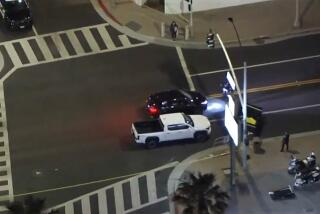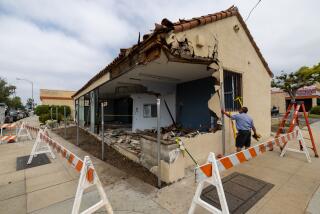Gas Pedal May Have Stuck on Car That Hit House, Killing Girl, Mechanic Testifies
The possibility of mechanical failure was raised Thursday in the preliminary hearing for a man suspected of being drunk when his car rammed into a home near Universal City, killing a 4-year-old girl as she slept on a sofa.
A mechanic from the Los Angeles Police Department testified in Van Nuys Municipal Court that the vehicle’s gas pedal was found jammed in the depressed position after the March 4 crash, and that a fallen cable prevented the accelerator from releasing.
The mechanic, Richard Schmidt, said he could not determine whether the gas pedal stuck before or after the crash.
The defendant, James Benjamin Masoner, 46, who is charged with second-degree murder and drunk driving, told police immediately after the accident that he had both feet on the brake as the car sped off the road and plowed into the home, detectives said.
Unable to Stop Car
Outside the courtroom, defense attorney Thomas M. Byrne asserted that the gas pedal stuck as Masoner drove downhill in the 3800 block of Broadlawn Drive just south of Universal City. Byrne said Masoner applied the brake but was unable to stop the car from plowing into the home of a neighbor, killing Jessica Shaner.
That assessment, however, was disputed by two experts called by the prosecution.
Arthur Van Steelandt, a senior engineer for General Motors Corp., said he believes that the accident damaged the throttle system and jammed the gas pedal.
Van Steelandt, who flew in from Detroit for the hearing, said he inspected Masoner’s 1983 Camaro and tested two other vehicles with similar gas pedals and concluded that the cable could not have fallen from the dash and wrapped around the accelerator on its own.
His analysis was supported by Charles F. Plemons, a private auto safety consultant from South Pasadena. Plemons said tests of the filament in the rear brake lights revealed that the brakes were not depressed when the car smashed into the home.
Brakes in Good Shape
Even if the gas pedal had stuck before the crash, Plemons said, the brake system was in good working order and had sufficient power to stop the car.
Plemons blamed the accident on the “driver’s lack of reaction to the situation,” saying Masoner failed to make a curve to the right and drove straight ahead into the Shaner home.
Defense attorney Byrne said a defense expert reached different conclusions, but he would not elaborate. That evidence will not be presented at the preliminary hearing but would be used at Masoner’s trial, he said.
The hearing, which began Wednesday, is expected to conclude today, at which time Judge Robert L. Swasey will decide if the prosecution has presented enough evidence to hold Masoner for trial on the murder charge.
Byrne said he will argue today that the case amounts to no more than vehicular manslaughter.
0.23% Blood-Alcohol Level
Testimony Wednesday revealed that Masoner had a blood-alcohol reading of 0.23% two hours after the crash. Under state law, a motorist is presumed to be intoxicated at a level of 0.10% or greater.
Two business associates of Masoner testified that they had attended a cocktail party on Wilshire Boulevard with him and driven him home against his will. They said that, after parking Masoner’s car near his home, they got into a second car to leave and saw Masoner get into his car and speed down the hill from his home.
The crash occurred only seconds later, they said. The man who drove Masoner’s car home testified that he had no difficulty operating the vehicle and found nothing wrong with the accelerator.
More to Read
Sign up for Essential California
The most important California stories and recommendations in your inbox every morning.
You may occasionally receive promotional content from the Los Angeles Times.










